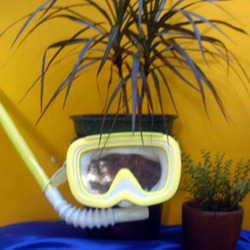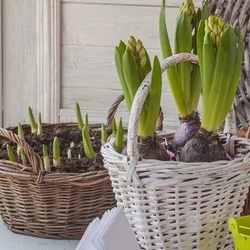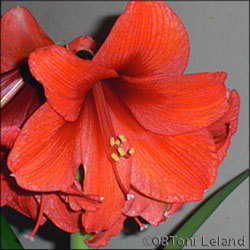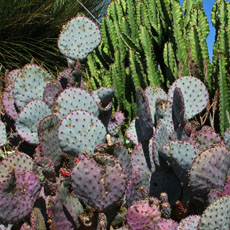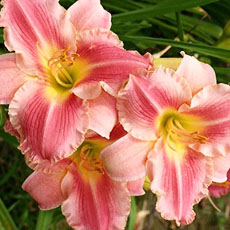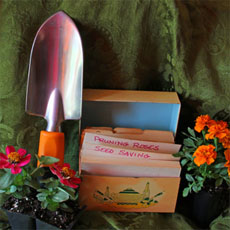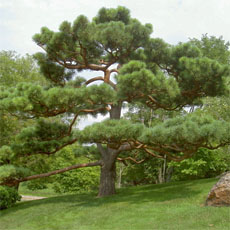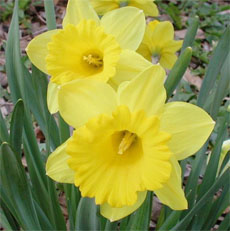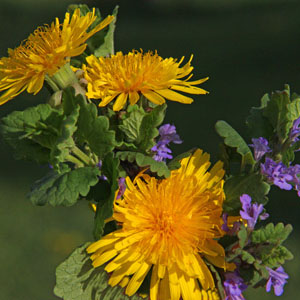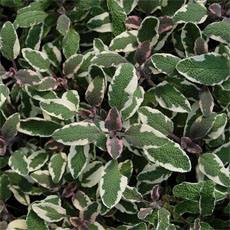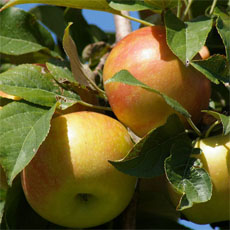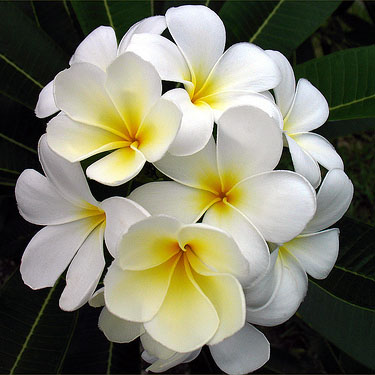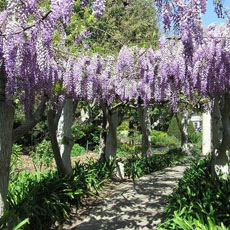Blooming plants are a joy to give and receive. And since every store sells blooming gift plants these days, chances are you'll get one. It could be a pot of forced bulbs, a potted plant, or a small blooming shrub. All of these kinds of plants need similar basic care to make the flowering display last as long as possible. After blooms are wilted, these plants offer different possibilities for long term garden use or indoor display.
The pink hyacinth at right has rebloomed well in the garden after a forced bloom.
General care of flowering gift plants
Sadly, but naturally, the flowering period is limited on forced bulbs (daffodil, hyacinth, tulip, lily), small shrubs (azalea and hydrangea) and potted plants (kalanchoe, cyclamen, orchid.) It's not in their nature to keep making new flowers indefinitely, the way annuals do. But we still don't want to lose precious days due to improper care. With the exception of orchids, which we'll discuss separately, those foil wrapped flowering beauties need similar care in the weeks following your receipt of them. Provide some light, but keep them away from hot sunny windows or cold frosty ones. Keep the soil moist, but not soggy. Water only if the top of the soil feels dry; once a week watering will probably be enough. Sometimes these plants arrive in a type of potting mix that can become water repellant if completely dry. You'll know this has happened if the plant seems unusually light weight or top heavy, and water runs through the pot immediately. You may have to give the plant several small sips in order to rehydrate the soil. Never let the plant sit in a puddle of water. Snip off any wilted flowers. If you are considering planting your gift, continue this care until mild weather arrives.
Making the gift last forever - keep indoors, plant, or discard?
Different species of plants vary in how well they can be expected to live after blooming as a gift. Bulbs will keep their leaves for a few weeks after flowering but then will go dormant despite the best of care. Shrubs cannot thrive indoors long term. Here's how to handle each kind of plant:
Bulbs and tubers
- Daffodils (Narcissus) are dependable rebloomers in most of the US. However they won't bloom in "low chill" southern and west coast zones. Bulbs may need to build strength in their first year, but they will often bloom thereafter. Dig a generous hole eight inches deep. Loosen soil in the bottom of the hole and mix in a small amount of fertilizer. Separate the bulbs and plant them several inches apart. Daffodil foliage dies down naturally about six to eight weeks after flowering. Remove yellowed leaves when this happens. Daffodils normally make new leaves after winter and bloom in early spring.
- Hyacinths - Beautiful fragrant Dutch hyacinths also make pretty hardy garden plants. Like daffodils, they do well in most of the US except the warmest zones, 9 and 10. Plant them as you would daffodills (above) and look for blooms again early next spring. Hyacinths may not be quite as dense and full as they were from the florist but they will smell just as sweet.
- Tulips - Forced tulips may not rebloom well. If you are of the "nothing ventured, nothing gained" mindset, plant them as for daffodils. Tulips bloom in mid to late spring.
- Easter Lilies - Large white Easter lilies can grow and bloom for years in zones 4 theough 8. Plant the bulb about six inches deep in full sun to part shade. Continue caring for the plant as long as the foliage is green and vigorous. The foliage may die off earlier than normal ths summer since the plant was "forced" to bloom. Your Easter lilies should flower again next year but not until their normal midsummer bloom time.
- Calla lilies - I hope all of you Southern gardeners received calla lilies. These can grow in zones 8 to 10, possibly in a zone 7 garden with care. PLant in full sun to bright shade. Plant so the tuber is just barely covered with soil. Callas can also be kept as potted plants. They are cousins to the wildflower "jack in the pulpit' and do not truly go dormant as daffodils and tulips do.
Shrubs
- Azaleas - Florist azaleas are not the same varieties bred for success in the garden. The "nothing ventured" type gift recipient might want to try planting the florist azalea. Azaleas prefer birght shade with some sun. and a well drained, humus rich, acid soil. Don't bother planting your azalea if you cannot provide acid soil.
- Hydrangeas - Hydrangeas can be planted out in zones 6 through 9 (sorry, northern gardeners.) They love a moist but well drained place, and sun.
Potted plants
- Cyclamen - Cyclamen can bloom for up to eight weeks, if they've been well grown before you received them. Keep them in bight indirect light, temperatures in the fifties F are best, and water them as described above. Use gentle fertilizer while the plant is in bloom. Florist cyclamen don't like the heat, and will naturally want to go dormant during the summer. If the plant declines, stop watering. Let it go dormant, store it in a cool place, and bring it out in September to try for a new round of growth and flowers.
- Kalanchoe - Showy florist kalanchoes are tropical succulent plants. Flowers last a long time. The plants are often kept for greenery, but forcing them to bloom again is not easy for the amateur. Zone ten gardeners can plant kalanchoe outside. The rest of us can set these outside for summer only.
Orchid
Ah, the "dreaded" orchid; actually most of the orchids sold as gift plants are the easy Phalaenopsis type. Their flowers last a very long time. Do not cut off the flower stem; it may add more buds next year. Keep out of direct sun and in temperatures 60 to 90 degrees F. Water no more than once a week, letting the water drain through the pot. Some orchids arrive in sphagnum moss which stays moist even longer than a week. Use a mild fertilizer solution during the summer. Decrease watering and stop fertilizing in fall. Expect new bloom shoots early next spring
... ... ... ... ... ...
Did you get a plant that I did not mention? Make a comment below, and I'll be happy to help, or try the Beginner Gardening forums.

